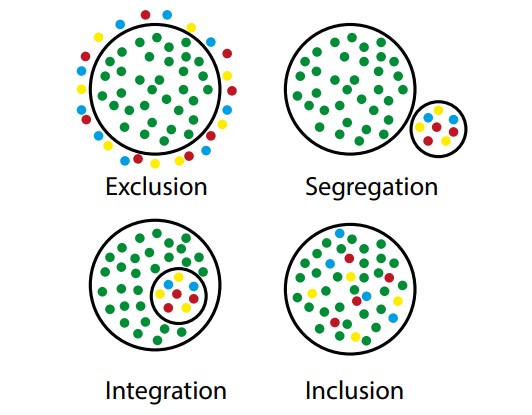Research - Combining access to higher education for refugees and theatre
Newsletter

In this research project, which is a Marie Skłodowska-Curie Individual Fellowship, Nina Lueck investigates access to higher education for refugees in Ireland. The project uses an innovative methodology mix of narrative interviews, thematic analysis, collaborative playwriting and staging the lived experience of refugee students.
The project analyses the support refugees receive when they access higher education both by universities and by the voluntary sector, and it illustrates how this support influences the lives of refugee students. It uses an innovative and interdisciplinary methodology mix which combines narrative and problem-centred interviews, sociolegal analysis and theatre playwriting about exclusion from higher education. Volunteers from the 51 interviewees and the MSCA Fellow are creating the script in a collaborative writing process. The play is called Food or Thought. It reflects a strong “Leitmotiv” which emerged from many of the 51 interviews which were conducted between February and September 2020, both on campus of University College Dublin and remotely. Refugee students in Ireland have to make a daily choice between attending meals in the hostels they live in (“Direct Provision”) and attending classes at university. As a result, many of the research participants are left without food or enough food regularly. The analysis reveals barriers students face not only in accessing higher education in Ireland, but also the ones after enrolment. These barriers are of financial, logistic, linguistic, psychological or physical nature. Here are some key findings from the coding and analysis process. They form the basis for the theatre play in which a group of students both with a refugee and an Irish background experience patterns of exclusion because of the refugee status of the protagonist named Grace.
1. The system of Direct Provision is a totally unsuitable form of accommodation for students. Room sharing with up to five other people who are not studying, lack of libraries or quiet rooms, and constant noise in the hostels are a huge burden for students. The system of Direct Provision and its psychological side-effects are particularly detrimental for students who suffer from depression, anxiety and post-traumatic stress syndrome. Direct Provision is not healing mental health issues but rather enforcing post-traumatic stress.

2. Finances are another obstacle. Whilst there are scholarships for international protection applicants under the University of Sanctuary schemes which all Irish Universities and a growing number of colleges are part of, there are not enough bursaries. The existing bursaries do not cover the actual costs, especially the cost and duration of travelling between the hostel and university. Refugee students who would like to support themselves still face restrictions concerning paid work. Students who have a scholarship at a Dublin university but live in the West of Ireland have no right to apply for a transfer of accommodation for educational reasons.
3. The support interviewees get from university staff (both academic and administrative) and from staff of the voluntary sector is a positive role model for other EU countries. In particular, the mentoring and the financial, logistic and psychological support during the access and enrolment process help refugee students to pursue a degree programme. Drop in sessions, coffee mornings and free soup meals are some of the many exemplary support mechanisms for refugee students.
4. Refugee Students need even more tailored medical and psychological support at universities and colleges. Many interviewees come from a cultural background where seeking counselling services is stigmatised, and the prevalent lack of diversity of university staff creates an additional hurdle to avail such services.
5. The majority of the students found it possible to integrate into the student community and enjoyed the study experience before the pandemic started. Interviewees got involved with student societies and reported that being a student helped to self-identify as “worthy” or “valuable.” Most students had not experienced any form of discrimination on campus, but rather in the town/place they lived in, by other residents. The pandemic created new barriers for refugee students: Only prepaid phones but no laptops, unstable WiFi in Direct Provision, and room sharing left refugee students with huge problems to follow their classes online.
With the roll-out of vaccines in Ireland and subsequent lifting of restrictions, the play will be staged with a diverse group of students in the foreseeable future. The outreach and impact factors of this project not only lie in the authentic storytelling which feeds into the playwriting process, but also create transfer of knowledge, for instance to the private sector and businesses in their diversity commitment, and to local communities in their efforts to be welcoming and supportive towards newcomers.
Nina Lück
Sutherland School of Law
University College Dublin, Ireland
nina.lueck@ucd.ie